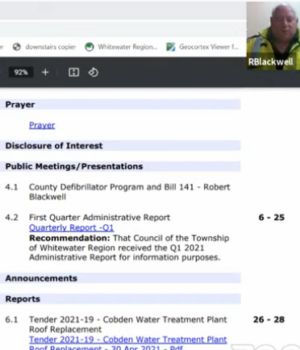The Township of Whitewater Region heard a presentation from Robert Blackwell on the status of a plan to make defibrillators available publicly in the Whitewater Region for public use in reviving heart attack victims.
Blackwell, a paramedic for 31 years, and eight years as the lead for the public defibrillator program, said there were 368 defibrillators in Whitewater Region, and there are
“30 public access defibrillators” among those.
“We’ve basically achieved phase one.” Blackwell said. “We’re looking for the Township’s aid in making Phase 2 and Phase 3 a reality.”
He said that Phase 2 began last year, with issues including defibulators being ‘locked away’ from public access.
“The reason they are behind locked doors and heated areas is because they can’t freeze.” he said, saying the batteries would be damaged. “We would like to take them outside these areas.”
He said outdoor heated defibrillator cabinets from Rondo Electric would be installed to allow for access in public places.
“It is the only cabinet in the world that can go out in temperatures of -41C.” he said. “I reached out to the manufacturer’s company in the Netherlands. I became a distributor of these cabinets, and that dropped the price down to half price.”
“That allows me to offer the cabinets to the municipalities free of charge.”
He said there’s an increased 7-10% chance of survivability with just CPR and 60% with the defibrilator’s equipment for cardiac arrest cases.
He said he’s asking the Whitewater council members to work with him to install the heated cabinets, and that they will “incur the cost” for maintaining the units.
He said Rondo Electric’s quote price is “about $150 a unit.”
He said he has already registered every unit and plans to have them registered with the ambulance dispatch center.
“That means that the dispatcher can inform the person where the nearest defibrillator is within a half-mile radius.”
He said that staff members at facilities must be trained in their use and must renew that training regularly, up to every year.
He said of a public training course, only five showed up and only one was part of the defibulator program.
“People just don’t want to pay for the life saving skills necessary.” he said.
Councillor Mackay asked if there’s any security on the units. “In the fairgrounds, we expect some vandalism.”
“We’ve talked about getting a number locking mechanism.” He said. “That way the dispatched can give that number for the locking mechanism, but it may not be appropriate for people who are panicking. We also know that in Whitewater Region, we know that our cellphone service is not the most reliable.”
Councillor McLaughlin asked if some of the service clubs will “take up some funding” for the program.
“They’ve helped out in Killaloe, Haggarty, and Richmond, so I’m definitely thinking they could help.” Blackwell said.
Reeve Regier asked who would look after the maintenance, and where the list of trained defibrillator personnel and who maintained it.
“I maintain all 368 defibrillators.” Blackwell said. “I have a contact person for every facility, and I call them and inform them when the battery is worn down. The battery is good for four years. The pads are good for two years. I order them through the supplier because the supplier gives us a really good discount. I maintain all of that free of charge, except for the cost of the battery.”
“I’m assuming we can easily start off with three to five this year. I’ve heard this year that the Trans-canada pipeline has just offered.”
Councillor Nicholson asked about the potential to help with the costs through the County of Renfrew and other local groups.
“I’m sure if we could do it on a county-wide basis, we could get more funding from the community service groups as well.” Blackwell said.
Councillor McLaughlin asked if GPS technology could be used as an antitheft measure.
“For the Whitewater Region., I’m not so sure of it because their GPS service works through the cellphone towers.”
“Well, that leaves us out.” Mayore Moore laughed.
The report was concluded.







![Kenopic/Smith Auction [Paid Ad]](https://whitewaternews.ca/wp-content/uploads/2018/10/advertising-100x75.jpeg)

